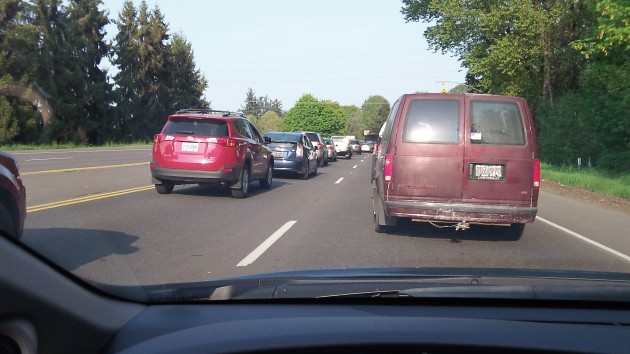
Technology will make it possible to keep track of where vehicles are. (These were stuck in a slowdown on Highway 20.).
July 1 is an important date not only because Oregon now allows the “recreational” use of marijuana but because it also is a milestone on the road to total surveillance. So far this surveillance covers only volunteers. But in 10 or 20 years, I doubt escape will be possible for any of us still around.
Oregon is starting its road user charge program with the volunteer owners of up to 5,000 vehicles. (I signed up my truck and expect to hear shortly whether it’s accepted.) In return for paying 1.5 cents per mile driven on public roads in the state, participants will get a refund of the state gas tax.
Volunteers have the choice of three wireless options to keep track of their mileage. One is available only to participants in an insurance-per-mile program. Another keeps track of the odometer but not where the driver has been. (That’s the one I picked.) It’s the third option that sounds ominous from the standpoint of where technology leads.
“Choose the Azuga option and you’ll have access to a number of valuable connected-car enabled services,” the invitation purrs. What are they talking about, in addition to the road user program?
Well, for example, the system will provide “visual trip logs” that “remember everywhere you’ve been so you can share it with friends and get there again.” Seems to me that if you want others to know where you’ve been, you can just tell them about it. Facebook is full of information like that.
This application, though, will do more. “See details about your trips like duration, cost and carbon footprint.” Think ahead a few years when, the way we are headed, the government will want to force people to reduce their carbon output. What better way to enforce those future regulations than to require all vehicles to report the carbon footprint of their use to the Bureau of Carbon Reduction?
But there’s still more. “Make it a game,” Azuga suggests. “Earn badges that unlock for good driving behavior. Compete with friends and family to see who can unlock the most badges. A great tool for drivers to stay engaged and connected with their driving.” Sure, and also a great tool for a future Environmental Behavior Iimprovement Administration (EBIA) to keep track of who is toeing the line and who is being reckless with the future of the globe. All they have to do is to mandate, in the name of public safety and health, the installation of Azuga-type monitors in every new vehicle, kind of like seat belts and air bags.
Just to make sure hapless citizens of the future don’t wander off their assigned reservations, the authorities will also be interested in “Safe Zones,” another Azuga service the company describes thus: “Offers peace of mind that anyone driving your car (such as a teenager) is safe by allowing you to set up geographical zones and be notified when the vehicle has crossed those zones.”
Who needs surveillance cameras everywhere, or identity chips implanted at birth, when the people in charge can make sure nobody crosses any of the lines it will draw? None of this can happen, you say? Maybe not now or next year. But as fast as the country is changing and old principles are tossed out, who can be sure about what’s ahead? (hh)



If the government (supposedly by and for the people) doesn’t force reduction of carbon emissions, nothing will be done to slow humans’ destruction of this old planet of ours.
So, enjoy the hot weather, Hasso…
One huge cargo ship from China produces more emissions than the entire state!
Hasso-
please add this link to my previous reply
Thanks
http://www.gizmag.com/shipping-pollution/11526/
Uh, a little over the top Hasso?
“Environmental Behavior Iimprovement Administration (EBIA) ” – really? Because when I had my Nissan Leaf the navigation system kept track of my driving efficiency and awarded “trees” for maximizing mileage and reducing carbon output. I glanced at it occasionally, but some folks REALLY took it to heart. You see, the information went back to Nissan in Japan so they could have data to improve their vehicles.
In case you didn’t know it, a lot of car navigation systems now send information back to the companies. Google tracks your location and sends you personalized ads because of what you search. Your cell phone company tracks your location and driving pretty much anywhere on the planet these days. If your pictures/video are backed up to the cloud, well they have them too. Oh yeah, and they sell their/your to each other.
And these businesses are free to do all this because it’s in the fine print of the contracts you signed with them.
The difference with government, is that IF they try and do the things you mentioned, it’s after legislative authorization. Already they can get a warrant before a judge and follow you and tap your phones if they have probable cause.
If you are truly incensed, you need to understand that you’re about 20 years late. and most of the government (NSA excepted) is about 15 years behind the private sector.
Tying the carbon footprint reduction with the legal-ization (adding of laws) to Cannabis is ironic. Many cities are banning outdoor grows. I guess they don’t realize that it takes a 1000w bulb which is on 12 hours a day when the plants are in flower to grow them optimally when done indoors. One light for two plants is typical coverage. The carbon footprint there is bigger than life … such a waste when the plant grows best when grown as God intended! Perhaps they have an interest in the power company when they do this?